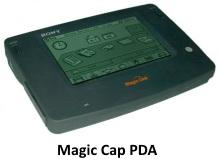Why 2016 Is a Little Like 1984
Source: Rick Merritt
 The vision of artificial intelligence is becoming a reality in a different and more nuanced way than technologists once imagined.
The vision of artificial intelligence is becoming a reality in a different and more nuanced way than technologists once imagined.
In the early 1990s when I was just getting started as a tech journalist, the tech landscape looked very different. The present was dominated by the 486 PC and the future was a blurry vision of something we called personal digital assistants (PDAs), a variety of pocket-sized gadgets that among other things would enable intelligent agents.
Startup General Magic, an Apple spinout, was one of the hottest embodiments of this future. Its clunky Magic Cap device was too big for the biggest pocket and its Telescript network programming language was a pale version of today’s Web and its many scripting languages.
Fast forward to 2016. Wafer-thin smartphones more powerful than a 486 PC are common, and everyone assumes they can connect to one big network that holds all the world’s information. It’s amazing, and a little scary.
At least for today, it turns out those intelligent agents people talked about are the products of a handful of companies that own giant collections of data centers. They include Apple, Amazon, Facebook, Google — and the world’s largest governments.
Most of the agents are what spy novels call double agents. They serve two masters — a consumer like you and me and their owner with the big data center.
Ostensibly the agents come free with an iPhone, a Facebook account or an Amazon Echo. Their real cost is they share their data with their vendor who resells it to his paying customers. As Peter Clarke, my colleague from EE Times Europe, puts it, “these days you are either selling or being sold.”
Few expected it would turn out this way. The visionaries weren’t predicting a World Wide Web, massively parallel distributed computing or the current kerosene — an emerging family of neural networking algorithms that run on those distributed data centers.
Today’s agents are still in their infancy. The convolutional and recurrent algorithms and the training and inference operations that drive them are still immature. Semiconductor designers are waiting for them to settle down so they can figure out how to carve in silicon accelerators that will give them much greater powers than they have today.
So in 2016, the landscape seems set for a battle among a handful of intelligent agents poised to become giants. Consumers and OEMs need to decide carefully which they will partner with and on what terms.
Arguably science fiction writers like George Orwell saw this coming long before the PC arrived. It took folks like Edward Snowden to make it clear that 2016 is in a way 1984.
A decade or two from now the tech landscape will look very different. We will probably look back at early agents such as Siri, Alexa and Cortana and laugh, much as we laugh today at the notion of PDAs. Hopefully, the laughter won’t be laced with too much wincing.
| }
|